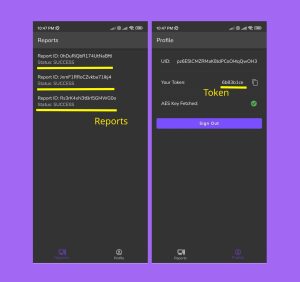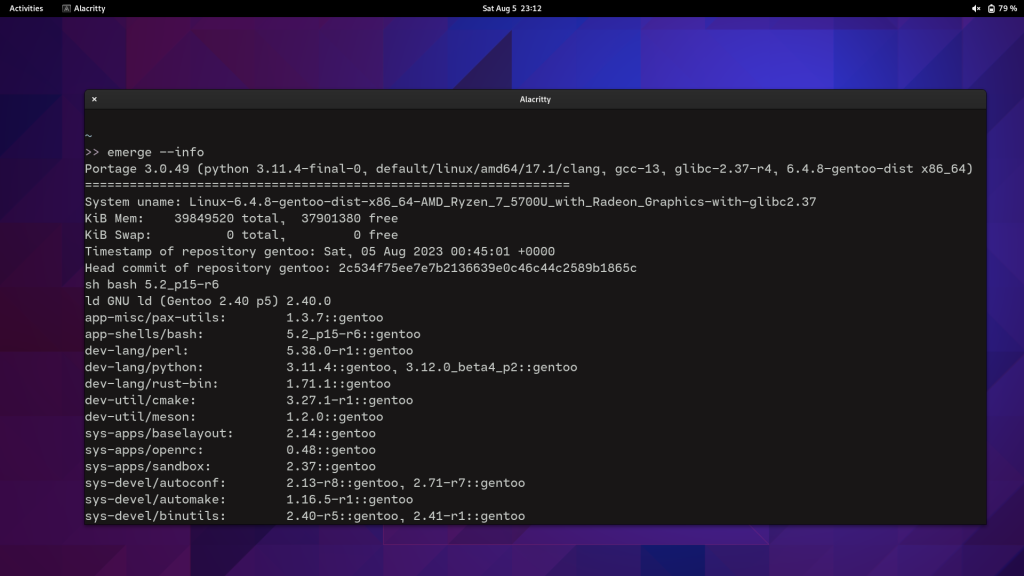Project Goals
Main goal of the project was to write an app that will automatically handle updates on Gentoo Linux systems and send notifications with update summaries. More specifically, I wanted to:
- Simplify the update process for beginners, offering a simpler one-click method.
- Minimize time experienced users spend on routine update tasks, decreasing their workload.
- Ensure systems remain secure and regularly updated with minimal manual intervention.
- Keep users informed of the updates and changes.
- Improve the overall Gentoo Linux user experience.
Progress
Here is a summary of what was done every week with links to my blog posts.
Week 1
Basic system updater is ready. Also prepared a Docker Compose file to run tests in containers. Available functionality:
- update security patches
- update @world
- merge changed configuration files
- restart updated services
- do a post-update clean up
- read elogs
- read news
Links:
Week 2
Packaged Python code, created an ebuild and a GitHub Actions workflow that publishes package to PyPI when commit is tagged.
Links:
Week 3
Fixed issue #7 and answered to issue #8 and fixed bug 908308. Added USE flags to manage dependencies. Improve Bash code stability.
Links:
Week 4
Fixed errors in ebuild, replaced USE flags with optfeature for dependency management. Wrote a blog post to introduce my app and posted it on forums. Fixed a bug in --args flag.
Links:
Week 5
Received some feedback from forums. Coded much of the parser (--report). Improved container testing environment.
Links:
- Improved dockerfiles
Weeks 6 and 7
Completed parser (--report). Also added disk usage calculation before and after the update. Available functionality:
- If the update was successful, report will show:
- updated package names
- package versions in the format “old -> new”
- USE flags of those packages
- disk usage before and after the update
- If the emerge pretend has failed, report will show:
- error type (for now only supports ‘blocked packages’ error)
- error details (for blocked package it will show problematic packages)
Links:
Week 8
Add 2 notification methods (--send-reports) – IRC bot and emails via sendgrid.
Links:
Week 9-10
Improved CLI argument handling. Experimented with different mobile app UI layouts and backend options. Fixed issue #17. Started working on mobile app UI, decided to use Firebase for backend.
Links:
Week 11-12
Completed mobile app (UI + backend). Created a plan to migrate to a custom self-hosted backend based on Django+MongoDB+Nginx in the future. Added --send-reports mobile option to CLI. Available functionality:
- UI
- Login screen: Anonymous login
- Reports screen: Receive and view reports send from CLI app.
- Profile screen: View token, user ID and Sign Out button.
- Backend
- Create anonymous users (Cloud Functions)
- Create user tokens (Cloud Functions)
- Receive tokens in https requests, verify them, and route to users (Cloud Functions)
- Send push notifications (FCM)
- Secure database access with Firestore security rules
Link:
- Pull requests: #18
- Mobile app repository
Final week
Added token encryption with Cloud Functions. Packaged mobile app with Github Actions and published to Google Play Store. Recorded a demo video and wrote gentoo_update User Guide that covers both CLI and mobile app.
Links:
- Demo video
- gentoo_update User Guide
- Packaging Github Actions workflow
- Google Play link
- Release page
Project Status
I would say I’m very satisfied with the current state of the project. Almost all tasks were completed from the proposal, and there is a product that can already be used. To summarize, here is a list of deliverables:
- Source code for gentoo_update CLI app
- gentoo_update CLI app ebuild in GURU repository
- gentoo_update CLI app package in PyPi
- Source code for mobile app
- Mobile app for Andoid in APK
- Mobile app for Android in Google Play
Future Improvements
I plan to add a lot more features to both CLI and mobile apps. Full feature lists can be found in readme’s of both repositories:
Final Thoughts
These 12 weeks felt like a hackathon, where I had to learn new technologies very quickly and create something that works very fast. I faced many challenges and acquired a range of new skills.
Over the course of this project, I coded both Linux CLI applications using Python and Bash, and mobile apps with Flutter and Firebase. To maintain the quality of my work, I tested the code in Docker containers, virtual machines and physical hardware. Additionally, I built and deployed CI/CD pipelines with GitHub Actions to automate packaging. Beyond the technical side, I engaged actively with Gentoo community, utilizing IRC chats and forums. Through these platforms, I addressed and resolved issues on both GitHub and Gentoo Bugs, enriching my understanding and refining my skills.
I also would like to thank my mentor, Andrey Falko, for all his help and support. I wouldn’t have been able to finish this project without his guidance.
In addition, I want to thank Google for providing such a generous opportunity for open source developers to work on bringing forth innovation.
Lastly, I am grateful to Gentoo community for the feedback that’s helped me to improve the project immensely.


